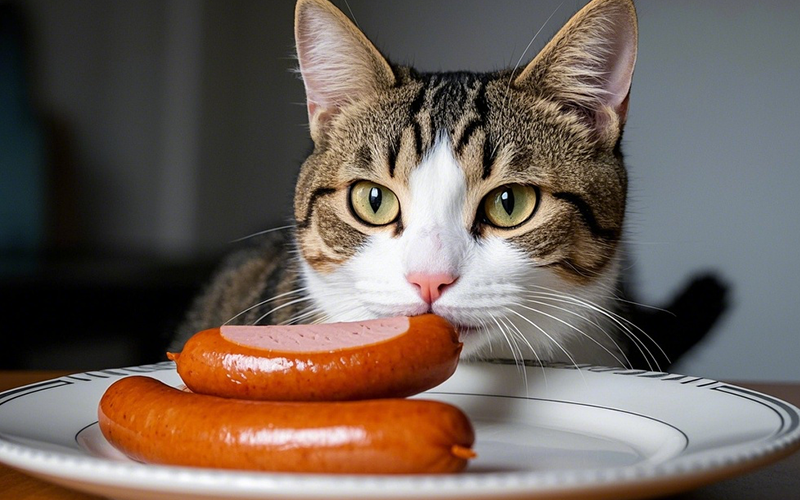Can Cats Eat Vienna Sausages? A Guide to This Popular Snack and Your Feline Friend
- 31 Mar 2025 11:17
Vienna sausages are a popular snack, but when it comes to sharing them with your cat, you might wonder, "Can cats eat Vienna sausages?" The short answer is that cats can eat Vienna sausages, but they should be given with caution. While they are not toxic to cats, Vienna sausages are not the best choice for your feline friend due to their high salt content and other additives. Here's everything you need to know about feeding Vienna sausages to your cat.

Are Vienna Sausages Safe for Cats?
Non-Toxic, But Not Ideal: Vienna sausages are made from meat, but they are processed and contain added ingredients like salt, preservatives, and sometimes spices. While they aren’t toxic to cats, these ingredients can pose health risks, especially if fed in large quantities or frequently.
High Salt Content: One of the major concerns with feeding Vienna sausages to cats is the high salt content. Too much salt can be dangerous for cats, leading to dehydration, kidney stress, or even salt poisoning. Cats are particularly sensitive to high levels of salt, so it's essential to limit their intake of foods like Vienna sausages that contain a lot of sodium.
Preservatives and Additives: Many canned or processed meats, including Vienna sausages, contain preservatives like nitrates or nitrites. These additives can be harmful in large amounts and should be avoided if possible. Furthermore, spices like garlic or onion powder, which are sometimes included in sausages, are toxic to cats and can cause serious health issues, including damage to their red blood cells.
What Happens if Your Cat Eats Vienna Sausages?
If your cat eats a small amount of Vienna sausage, they may not experience immediate issues. However, if your cat eats too much or frequently consumes foods high in salt and preservatives, the following problems can occur:
Dehydration: The high salt content in Vienna sausages can cause your cat to become dehydrated, especially if they don't drink enough water to counteract the salt.
Gastrointestinal Issues: Eating processed meats with spices and preservatives can lead to an upset stomach, diarrhea, or vomiting.
Kidney Stress: Consuming high amounts of sodium over time can put stress on your cat’s kidneys, potentially leading to long-term health issues.
Toxicity: If the Vienna sausages contain garlic or onion powder, it can cause poisoning in cats, leading to symptoms like lethargy, loss of appetite, and digestive distress.
How to Safely Offer Vienna Sausages to Your Cat
If you decide to offer Vienna sausages to your cat, keep these guidelines in mind:
Limit the Quantity: Give only a very small amount of Vienna sausage as an occasional treat. Avoid making it a regular part of your cat’s diet.
Look for Low-Sodium Versions: If you do choose to offer Vienna sausages, look for a version with low or no added salt. However, even low-sodium sausages still contain preservatives and additives, so moderation is key.
Remove Seasonings: Always check the ingredients list to ensure there are no added spices like garlic or onion powder, which can be toxic to cats.
Monitor Your Cat: If you give your cat any processed or new food, monitor them closely for any signs of digestive issues or discomfort.
Safer Alternatives for Cats
If you're looking for healthier and safer treats for your cat, consider these alternatives:
Cooked Meat: Plain, cooked meat (like chicken, turkey, or fish) is a much better option. It’s high in protein and easy for cats to digest.
Catnip: Safe and stimulating for many cats, catnip can be a fun treat.
High-Quality Cat Food: Stick to specially formulated cat food that provides the proper nutrients for your cat’s health.
Conclusion
In conclusion, Vienna sausages are not ideal for cats due to their high salt content and the potential presence of harmful preservatives and spices. While a small amount won’t likely harm your cat, it’s important to avoid feeding them processed meats on a regular basis. For your cat's health and well-being, focus on providing a balanced diet with high-quality cat food, and save treats like Vienna sausages for very occasional indulgence.
For any concerns about your cat's diet or if you're unsure whether certain foods are safe, PettureX offers real-time consultations and can help ensure your cat stays healthy and happy! 🐾
Related

Frankly Dangerous: Can Cats Eat Hot Dogs? Vet Explains the Serious Risks
- 16 Apr 2025
A Purrfect Protein? Can Cats Eat Ground Turkey Safely? (Vet-Reviewed Guide)
- 16 Apr 2025
Gritty Situation: Can Cats Eat Grits Safely? Vet Explains the Risks
- 16 Apr 2025
Gravy Danger Zone: Can Cats Eat Gravy Safely? (Vet-Reviewed Warning)
- 16 Apr 2025
Crunchy Query: Can Cats Eat Green Peppers? A Vet-Reviewed Safety Analysis
- 16 Apr 2025
Toxic Temptation: Can Cats Eat Grapefruit? Vet Explains the Dangers
- 16 Apr 2025
Emergency Meal or Major Mistake? Can Cats Eat Dog Food For A Couple Days? (Vet Guide)
- 16 Apr 2025
Dandelions & Felines: Can Cats Eat These Common Weeds Safely? Vet Explains
- 16 Apr 2025
Flaky Danger: Can Cats Eat Croissants Safely? Vet Explains the Buttery Risks
- 16 Apr 2025
Hazard Alert: Can Cats Eat Corn Husks? Vet Explains Dangers of This Fibrous Material
- 16 Apr 2025
